The cost of climbing Kilimanjaro is non-trivial.
Many people commit to climbing Kilimanjaro before thinking through the full financial implications.
In this article, we discuss costs for climbing Mount Kilimanjaro. We'll also look at some expenses that you need to consider that most people forget to account for.
If you want to skip this and are looking for a Kilimanjaro quote, click here.
Quick Takeways
Climbing Mount Kilimanjaro involves several expenses. Here's a breakdown of the key costs:
- Flights: Approximately $1,300 (£950) for international round-trip flights to Kilimanjaro International Airport.
- Kilimanjaro Packages: All-inclusive packages range from $2,000 to $3,500, covering park fees, guides, porters, meals, and accommodations. Get a quote here.
- Equipment: Budget around $500 for essential gear like hiking boots, thermal clothing, and a quality sleeping bag.
- Vaccinations and Medications: Allocate approximately $200 for necessary vaccinations and medications, including malaria prophylaxis.
- Travel Insurance: Comprehensive coverage, including high-altitude trekking, typically costs about $150. Get an Kilimanjaro insurance quote.
- Tips for Guides and Porters: It's customary to tip, totaling around $250 for a standard trek.
- Miscellaneous Expenses: Set aside an additional $200 for souvenirs, meals outside the trek, and unforeseen costs.
- In total, expect to budget between $4,600 and $5,100 for the entire Kilimanjaro experience.
How Much Does It Cost To Climb Kilimanjaro?
Generally speaking, you should be prepared to spend around $5000 (£3,500) for a Kilimanjaro trip. The biggest price-points are flights and which operator you choose. You can undoubtably do the trek for less but you should ask yourself what corners are being cut to lower the price.
The total climbing Kilimanjaro cost is usually significantly more than the travel package numbers that you see on travel/adventure tour websites.
There are a number of costs that are not accounted for in the total travel package cost.
In our experience, there are 7 key costs that you should budget for, as follows.
Getting to Kilimanjaro - Flights
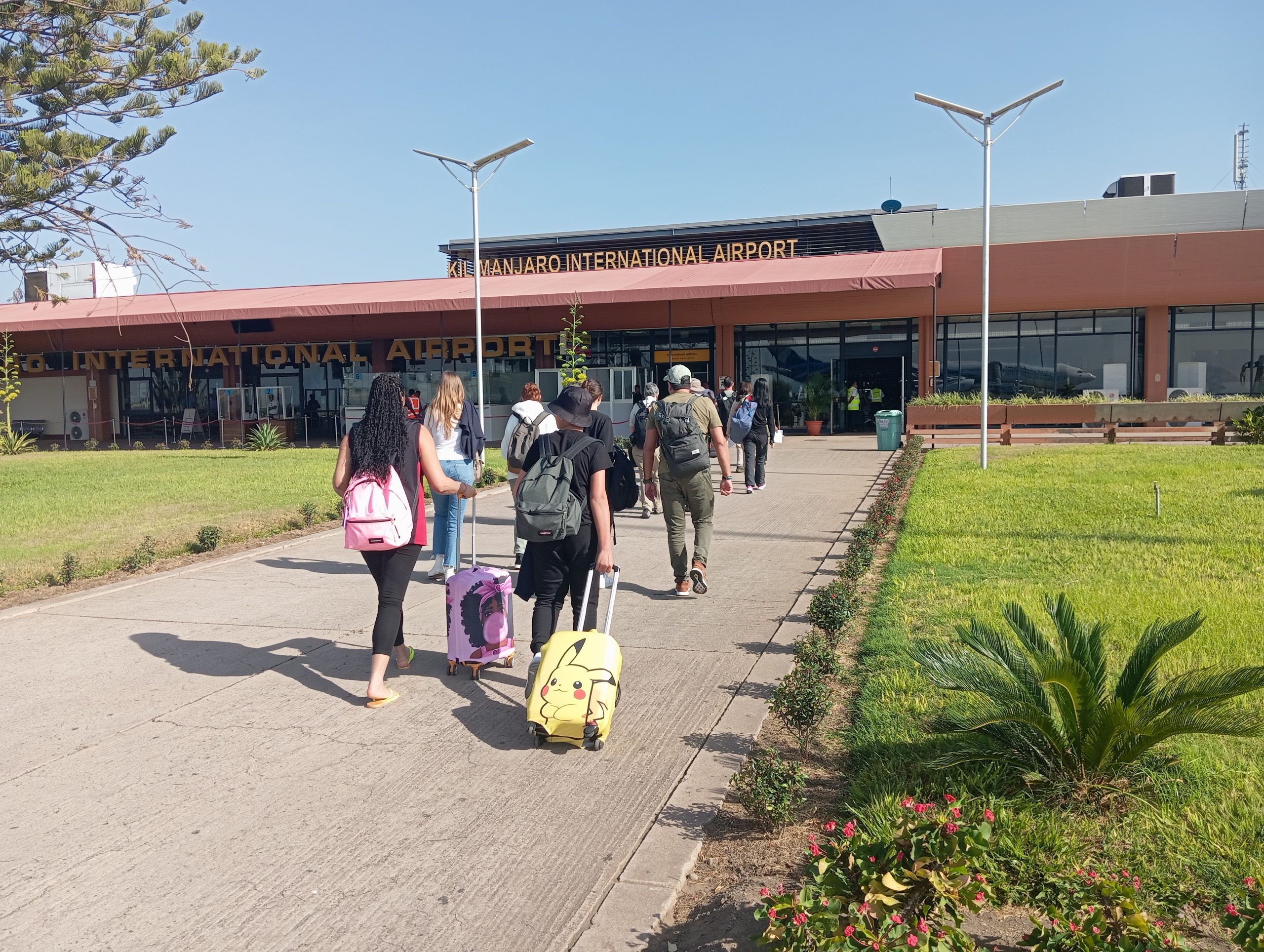
International flights to Kilimanjaro airport make up a significant chunk of your costs for this trip.
The cost of getting to Kilimanjaro usually accounts for a significant portion of your total Kilimanjaro adventure.
Depending on where you are flying from you might have a journey that involves two connections. Most climbers from America, Canada, UK and Europe fly to Amsterdam first and then catch a connecting flight on KLM direct to Kilimanjaro. You can check availability and prices for this KLM flight here.
For those flying from within Africa or from Australia, it is easier to fly to Nairobi or Addis Ababa and then catch a connecting flight (typically Precision Air - not sure how Precise they are, Ha!) to Kilimanjaro International Airport.
Those coming from Asia or the Middle East may want to look at Turkish Airlines that fly direct to Kilimanjaro with KLM from Istanbul.
Budget at least $1,300 (£950) for flights
Climbing Kilimanjaro packages
Most trekkers book their climbing adventure through established Kilimanjaro tour operators who typically offer all-inclusive packages which include airport transfers, a night in a hotel before and after the trek and all expenses on the mountain (National Park fees, food, porters, guide, tents etc.).
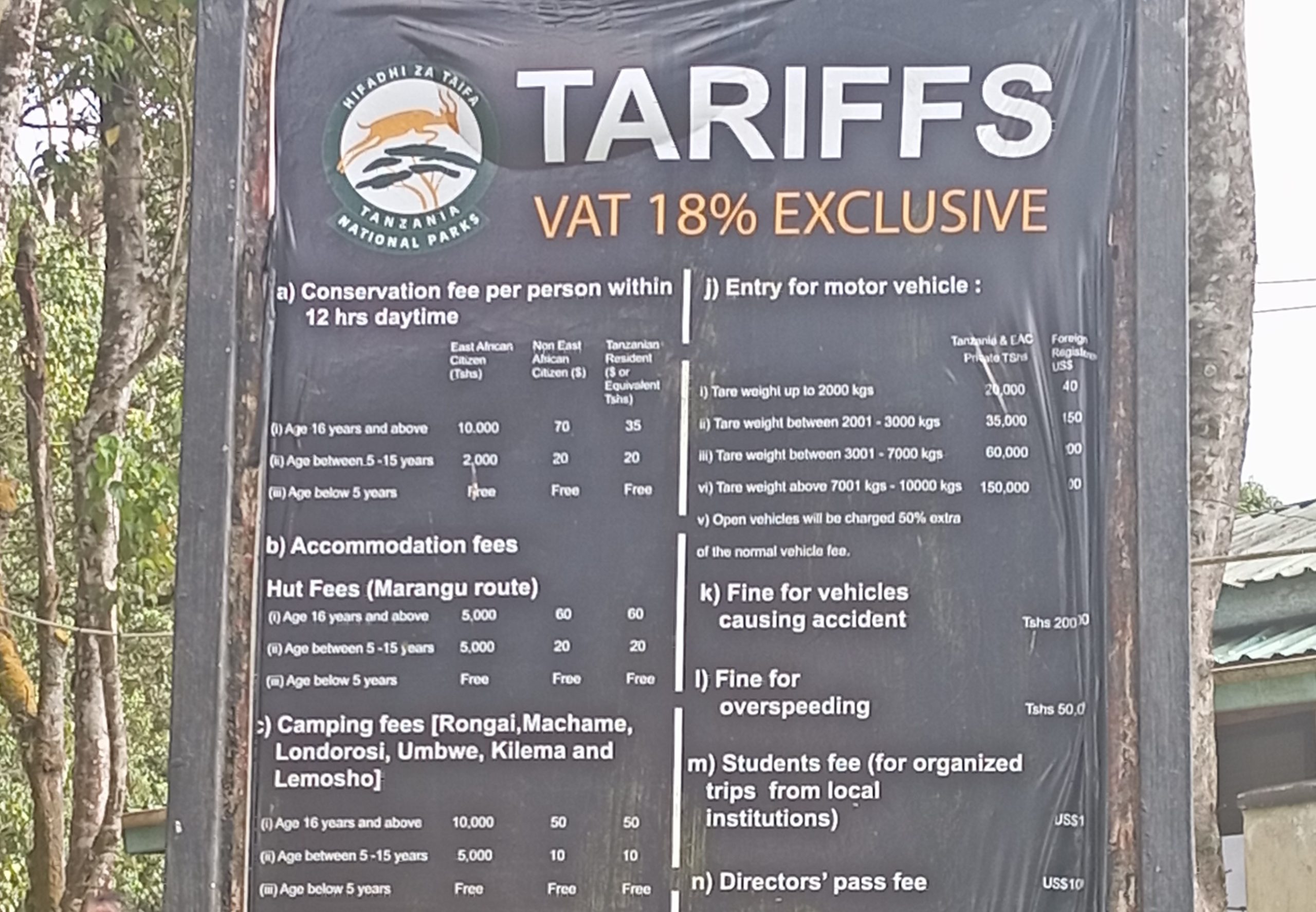
When you start factoring in conservation fees and camping fees per person, you can see how the cost of this trek quickly adds up!
Note: Kilimanjaro National Park fees alone account for 50-70% of the trek cost.
The cost of a tour varies depending on what type of operator you choose, whether you join an open group or go privately, which route you take and the number of days on the mountain..
Note on Kilimanjaro Tour Operators
There are over 200 operators on Kilimanjaro. The market splits into three broad categories
1. Cheap local operators
There's a spectrum of players here but bear in mind that it is very difficult to operate a 7-day Kilimanjaro climb at under $1800. The Kilimanjaro National Park permit alone is $1000. This leaves $800 for all the crew salaries (guide, porters, and cook for 7 days - each climber will have on average 3 people supporting them), all the food on the climb, transfers to and from the mountain, and some money left over to make a small margin. The only place to find savings is in paying the crew very little or in some cases not at all (yes, shockingly some operators don't pay their staff, and instead they have to rely on customer tips). This is not to mention other porter welfare issues like limited food on the trek, poor clothing, shoes and equipment and many porters crammed into tents at night. The Coronavirus pandemic has only exacerbated these issues as companies are so desperate for clients that they have dropped prices to exploitative levels.
2. Affordable local operators
Again there's a spectrum here. But anywhere between $2000-$2400 for a 7-day hike with a good local Kilimanjaro operator is standard. This usually includes all the bells and whistles including airport transfers, pre and post hotels and various other additions. Most importantly the support crews are more often than not well paid, fed and equipped for the mountain.
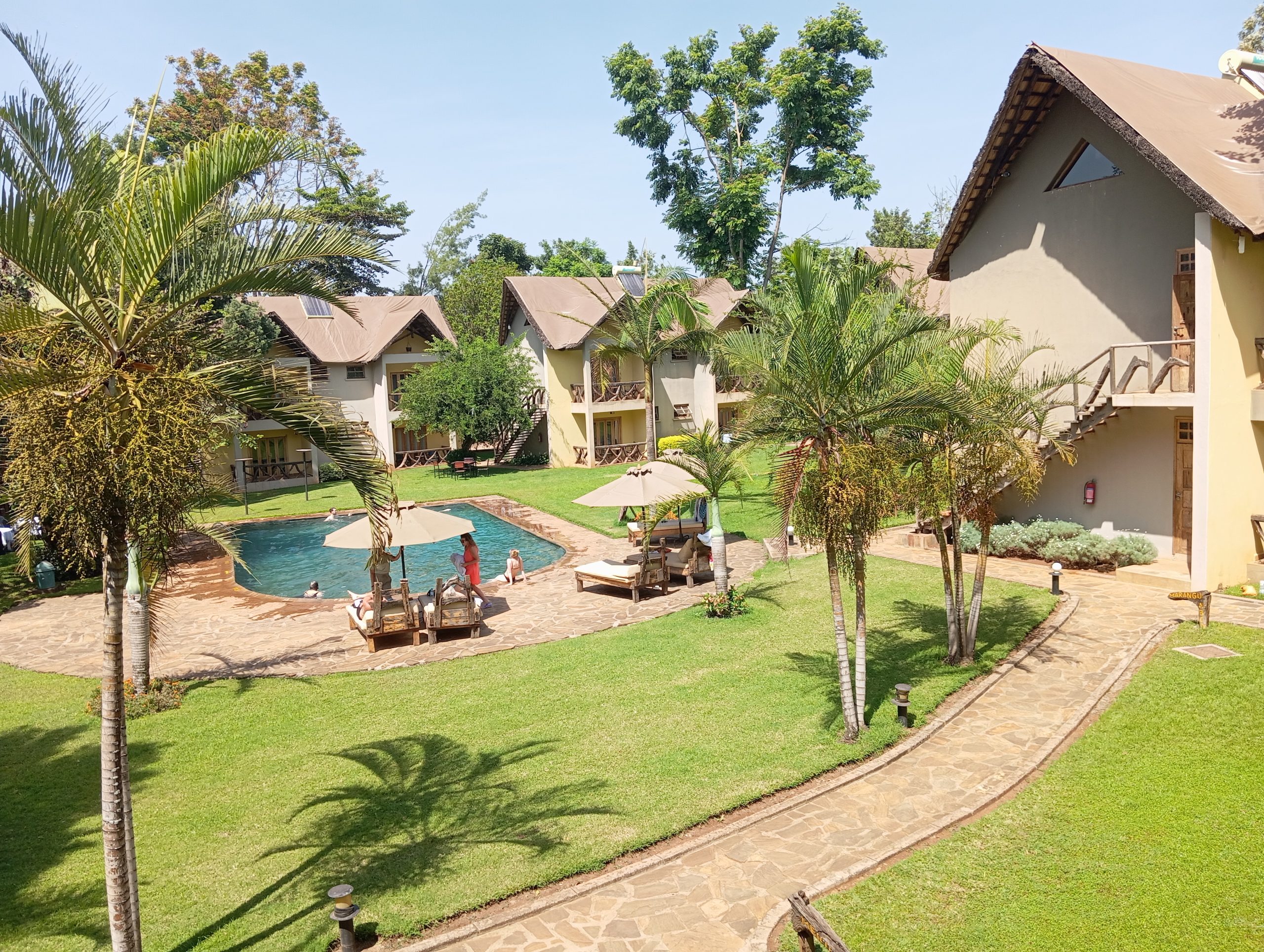
Lodge accommodation near Moshi during my most recent Kili trip. Good local operators make sure their pre and post trek accommodation is also up to standard.
3. Western operators
In general, the major Western operators run good quality adventures. But it obviously comes at a price. This is because they build in Western level margins for themselves and often have higher running costs as their marketing and sales staff are based in the US and UK. Many of the Western operators actually outsource to local ground operators, like the companies I mentioned under category 2.
There are seven routes on Kilimanjaro. Northern Circuit is the most expensive route as it is the longest on Mount Kilimanjaro. Trek lengths range from 5 days (cheapest) to 10 days (most expensive).
Five-day treks are too short for the average hiker in terms of acclimatisation (less than 50% of trekkers reach the summit on the 5-day treks).
If you are looking to go budget we suggest choosing a six-day trek which usually gives you an acclimatisation day, and increases your probability of summit success. If you want to really increase your chances of reaching the summit then a 7 or 8-day trek gives you the best shot.
Budget $2,000-$2,500 (£1,500-1,900) for all inclusive 7 or 8 day trek packages (excludes flights)
Plan your Kilimanjaro trek
Get a quote from my recommended local Kilimanjaro operator
Tanzanian visa
Most trekkers need a visa to enter Tanzania. You can either organise a visa with your local Tanzanian embassy or purchase a visa on arrival in Kilimanjaro. We suggest getting a visa before you depart as it means you can avoid the queues at Kilimanjaro International Airport.
Budget $50 (£30). For some reason, US citizens have to pay $100.
It's worth mentioning that on my last trip to Moshi, one of our group members was charged 100 Euros at the Visa desk. There's unfortunately still some level of corruption so bring a little extra but keep fingers crossed you won't need it!
Vaccinations and medications
Tanzania is a malaria area as well. The risk of contracting malaria is relatively low on the mountain as mosquitoes are not found at high altitude (over 1,800 meters). You will be spending most of your trip above this altitude but will be at risk before and after your hike.
Taking malaria tablets is really up to you. There is a cost associated with the medication that can be quite high. Either way, we recommend taking all common-sense precautions to avoid being bitten by mosquitoes - i.e. wear Deet repellent, wear light clothes that cover your arms and legs, stay indoors before dawn and after dusk.
If you plan to go on safari after your trek then we recommend taking malaria tablets.
Some trekkers may also need a Yellow Fever vaccination card when entering Tanzania (you only need this if you're travelling from a country that has high Yellow Fever transmission rates - citizens of UK, US, Europe, Canada, Australia and many others don't need a YF vaccination). Costs for Yellow Fever vaccinations vary but can be as much as $100.
In addition to Yellow Fever, you may want to get a HEP-A vaccination and a Polio Tetanus-Diphtheria booster.
For details on vaccinations for Tanzania see here.
Budget $150 (£100)
Equipment and kit
It is important that you purchase the right equipment for trekking Kilimanjaro. This includes layered clothing, an extreme weather sleeping bag, walking poles, good quality hiking boots, a headlamp, duffel bag, daypack and insulated water bottles.
The costs can vary depending on the quality of the equipment you buy and whether you already have lots of equipment in your possession.
Some operators include things like sleeping bags or duffel bags in their trip price. If you are missing certain pieces of gear, you will be able to hire these from your trekking operator.
Budget $800 (£600) to get fully kitted, less if you already own equipment (i.e. hiking boots, sleeping bag etc.)
Tipping guides and porters
Tipping your support team is standard on Kili. Your guides and porters work extremely hard for very little money. The tips that they receive after the climb go a long way to support their families who they don't see for weeks on end. If you can afford it we suggest paying more than the standard rate of approx. $300 per climber for your support team.
Here is a detailed article on tipping guides and porters on Kilimanjaro.
Budget $300 (£250)
Miscellaneous expenses
Inevitably you will end up spending money during your hotel stay before and after your climb.
Another expense you may not have considered is the hire of portable toilet for your trek. Some operators include this as a standard. If they don't, you can look at a cost of around $150-$200 which gets split amongst the members of the group. This is an optional extra but personally, after seeing the toilets on Kilimanjaro, I would call it an essential!
Set aside some cash for those miscellaneous expenses.
Budget $200 (£150)
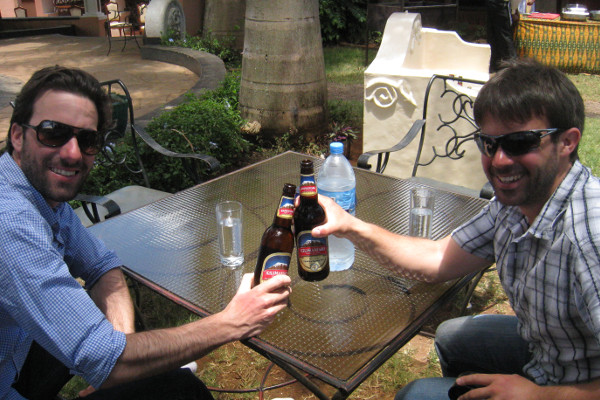
Total Climbing Kilimanjaro Cost = ~$5,000 (£3,500)
We hope this article has provided more clarity on the cost of climbing Kilimanjaro. If you have any questions feel free to leave a comment below and we will respond on this page asap
See here for a comprehensive Kilimanjaro gear packing list.

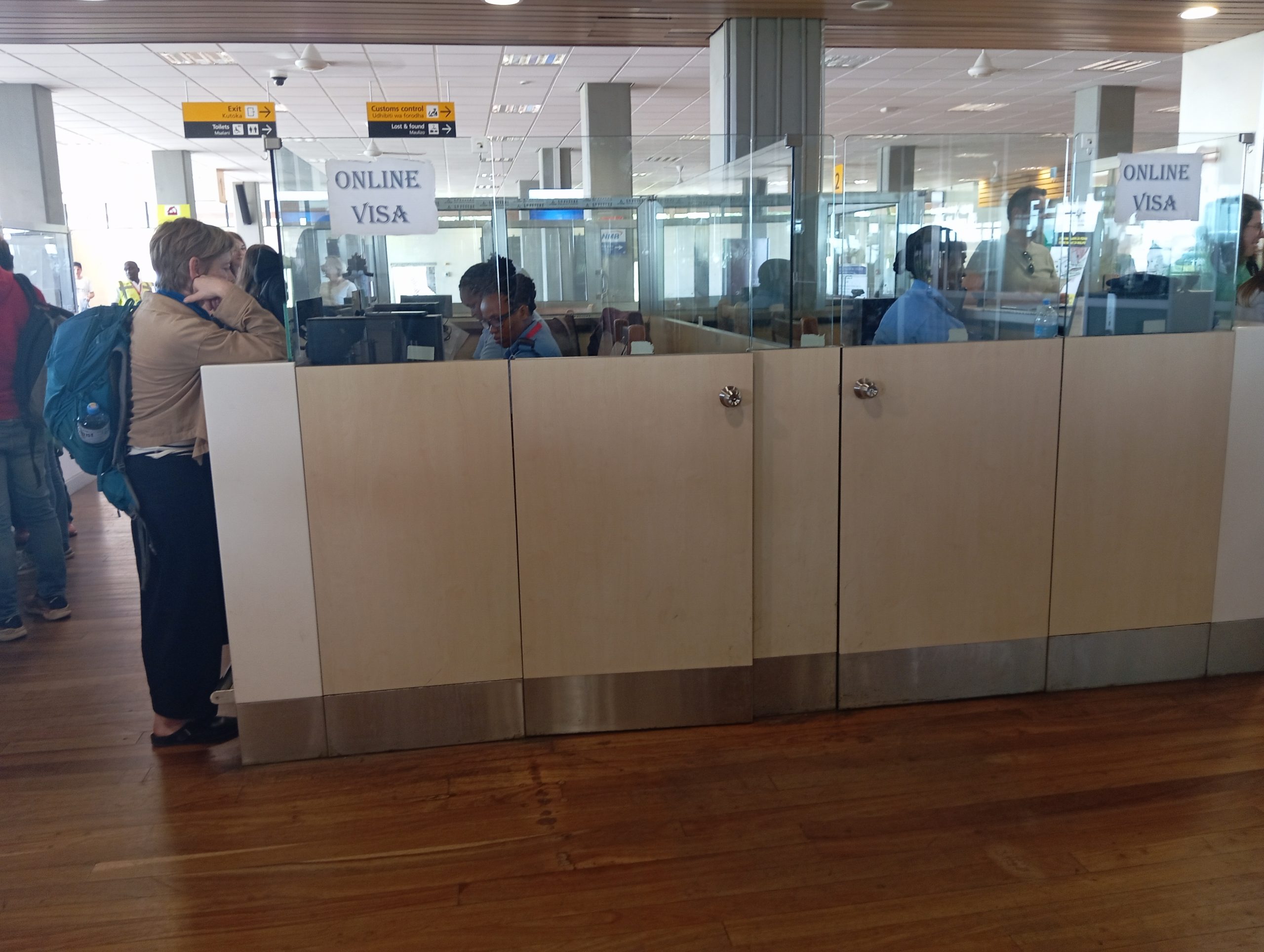

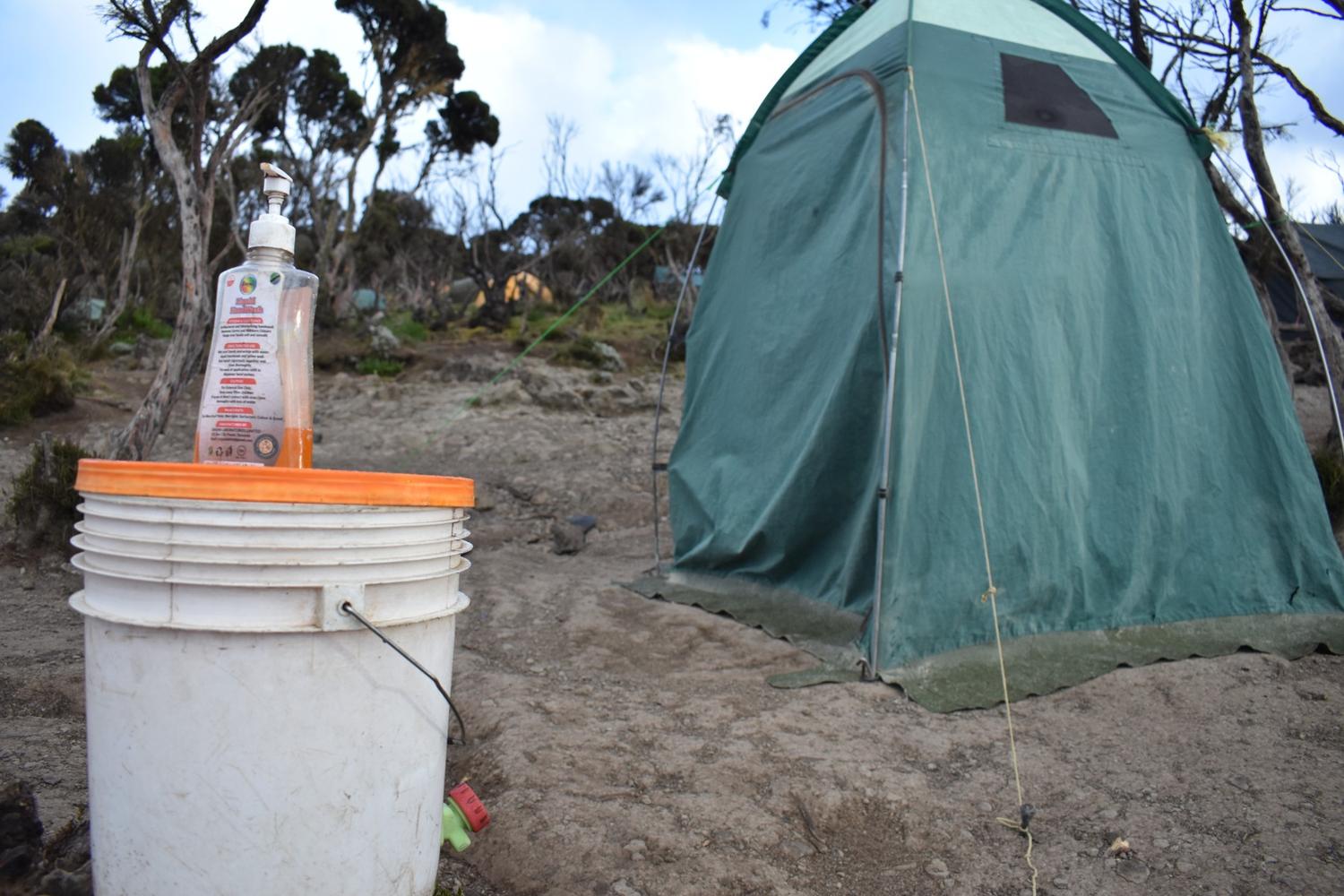
This is a very helpful site-thank you! I'm planning on climbing Mr. Kilimanjaro in September of 2026. I train regularly and have climbed Mt. Whitney, in California.
I'll be reaching out to your site but would like to know when is the optimal time to plan on booking.
Thanks again!
Hi Monica, thanks for your kind words. The best time to climb Kili is either Jan-March or June-October. In terms of booking I recommend at least 3-6 months out to give yourself enough time to train etc.
I’m 68 yr old woman. My sister is 70 and has had a knee replaced. We are in good health and are physically active. Are there special concerns we should have about climbing Kilamanjaro?
Hi Susan, it is difficult to judge your capabilities without having hiked with you, but uf you and your sister are able to hike for 5-8 hours a day over tough terrain for 6-7 days, then you should be fine. Personally, I think your sister will struggle and she wouldn’t be doing any favours to her knee, as it does take it’s toll on the joints, especially on the descent.
Hi
I would like to climb Kili for my 60th birthday, hoping to do the summit and watch the sun rise on my big day. I am a single woman, about 4st overweight, now, but I have nearly shed 2 St and intend to lose the other3-4st before I go. I am also very unfit, but again, I am seriously trying to get fit and currently have 6 months before my birthday.
Am I completely mad? Do I stand a chance? I'd like you to be honest, as its going to cost a lot.
My aim is to spend a few days to a week in Tanzania, then climb, the longest route I can find, then have a little holiday at the end.
Seriously, am I mad to think I can do this?
Ange
Hi Ange, it’s difficult to judge your fitness level over the internet, but I think if you seriously set your mind to it and train hard for the next six months, then I would say you can do it. I would suggest taking the 8-day Lemosho, and it’s worth spending a week after the climb going on safari or visiting Zanzibar. Here’s some inspiration: https://www.climbkilimanjaroguide.com/can-anyone-climb-mount-kilimanjaro/
Hi, do you have an indication of how many trekkers climb each route each year? across all routes it is said to be over 30,000 each year, but how many fall on the lemosho and machame routes?
Hi Frithjof, I don’t has stats on the individual routes, but I would estimate 35%-45% use the Machame, 20-25% use the Lemosho, and the rest are spread across the Marangu, Rongai and Northern Circuit.
Hi Mark –
Thanks for this very informative website! Basic question though, as someone who will have a finite amount of time on the continent: is Kilimanjaro really, truly amazing in and of itself? I love to hike and have been lucky to hike several 14+ in the US and a bit in the Himalayas, and would enjoy the challenge. But other than being the tallest mountain in Africa, is it an amazing experience? Why?
Hi Kristin, yes, the mountain itself is very impressive. A massive free-standing mass, quite different to a mountain range experience. The hike is a big challenge and summiting is very memorable and rewarding, so overall I would recommend it.
Hey Mark, so by the explanation above you mean someone can not do Kili for 1950 $?!
Hi Gasper, you can hike Kilimanjaro for $1950. In fact, you can hike it for cheaper – some operators get as low as $1500 on the 5 day Marangu. See the section above on climbing travel packages. I would however caution against the very cheap offers as someone is definitely getting exploited. For a 7-day hike with pre and post hotels and airport transfers you should expect to pay between $2-2.4k for a good quality and responsible local operator. The other costs on this page include everything that one should expect to pay (incl. flights, tips, visas, insurance, equipment etc.).
Hi Mark
What a brilliant Kilimanjaro website. It has been a mountain and region of much interest from long before Covid when the mountains of India, Pakistan, Nepal, and Argentina had our attention.
My son Patrick is keen for a good non-technical climb before starting university, which leaves us with a travel window around late October into November. We understand the weather implications (meteorology was my career) as we move away from peak season. This of course thins the crowds. Your thoughts on a November climb would be much appreciated.
Last but not least, we would love your best recommendation for a local operator that runs a well-timed climb itinerary (good acclimatization) pays there staff a fair wage that keeps money in Tanzania.
I know southern Africa quite well but if you had any thoughts on neighbouring Kenya and/or Mozambique, we definitely owe you a beer.
Thanks for putting together a well-crafted and informative website.
Mark & Patrick (Nelson Bay, Australia)
Hi Mark, thanks for the great feedback!
November can see quite a bit of rain but the northern approach via the Rongai route is often dry during this time, so I recommend looking at that route. The summit night push on the Rongai is a little more challenging though than the Southern circuit routes.
You can get a quote from my recommended local partner here: https://www.climbkilimanjaroguide.com/go/
In terms of additional tours, I recommend a Northern Circuit safari into the Serengeti: https://www.climbkilimanjaroguide.com/serengeti-safari/
I hope you have a blast! Mark
how far in advance does a group of 3 need to make bookings for 7 to 10 day climb in Sept or Oct
There are no quotas on the number of permits for Kili, so it is possible to book last minute. But to ensure you get a good operator and affordable flights etc, I recommend booking at least a month in advance.
Hi Mark,
What is your recommendation for paying for a climb. Most operators want at least on booking, with most if not all 10 days prior to departure. Is it common for your companies to cancel and not refund? How do do you know a place is really legit,
Would you use PayPal? Bank transfer, credit card?
Any help would be appreciated.
Hi Dave, all legitimate Kilimanjaro companies will take a deposit to secure a booking (this is usually around 20%), and final payment 4-8 weeks before departure. Before booking, I would recommend you check what their cancellation policy is. Many companies offer a full refund up to 30 days before departure, but it’s not uncommon for travel companies to retain deposits for late cancellations etc. With Covid, many companies have adapted their cancellation policies to provide as much flexibility as possible. As for establishing whether a company is legit, I would look for the following key signals. 1. a quality website that demonstrates the company in question is a real operation with genuine expertise, 2. a large and varied review profile on platforms like TripAdvisor, Trustpilot, Feefo and other third party sites like Tour Radar, Bookmundi etc, and 3. a price that is reasonable – if it seems too good to be true it probably is. That’s not to say that you will get ripped off on the low end, but someone is definitely being screwed if you are paying $1600 or less. Payment via PayPal, Bank Transfer and Credit Card are all very common. I would probably avoid a company that uses Western Union though. If you would like to get a quote from our recommended local partner go here: https://www.climbkilimanjaroguide.com/go/
Hi, is it possible to hike kili just by myself. I mean purchase the permit and then do it alone? Or do I need to hire local guide? I’m used to hike a lot and all the time just by myself or in a small group of friends but I’m not a fan of organized tours 🙂
Hi Jakub, unfortunately at a minimum you need to take a registered guide.
Hi, great post. What about doing only one day trek? Up and down from/to Marangu until Mandara huts. I am a trail runner and I am use to do three times this distance and altitude in a normal trainning day.
Will I be allowed to do this? What kind of permit do I need? Altough I guess it’s mandatory to hire a guide, do I need to go with him or her? Or can I go up and down running by myself.
Thanks
Hi Samasan, I’m not sure if it is possible to do a one day trek on Kilimanjaro. Permits are usually for 6-8 days. You will need to contact a local operator to see if they can arrange a bespoke one day trek for you. All the best!
Do you know if tours provide discounts for groups of 3 or more? I want to do this with my wife and son. A few of our friends may be interested in joining us.
Hi Stephen, yes, most tour operators will offer group discounts as your party expands. Many tour operators also run open groups where you can benefit from the scale of the group for better pricing. All the best!
Hi
My brother and I are coming to climb Kilimanjaro in October and would like to add on a safari, prices seem high at 500 dollars per person per day, is this about right?
Steve
Hi Stephen, yeah, that seems about right. Park fees in Tanzania have gone up recently with VAT now an additional cost. You can get cheaper safaris but these tend to be large groups or super budget.
Hi I am a student nurse from the UK and going over to Tanzania for five weeks. Three weeks of this will be spent volunteering and the last two weeks, climbing Kilimamjaro and getting home. I was wondering if my lack of physical activity in those first three weeks would jeopardise my climb up Kili?
Hi Melissa, I definitely think volunteering will be beneficial for you personal and for those you are helping, and will likely have neglible impact on your Kilimanjaro climb. From an acclimatisation perspective there certainly isn’t any benefit of spending time on the lower reaches and flatlands below Kilimanjaro. You might want to take a few days over one of the weekends and climb Mt. Meru, which would be super beneficial for your Kilimanjaro ascent!. Hope this helps!
Hi,
This is Sunil from India, which is good season for trekking to kilimanjaro.
Hi Sunil, see here: https://www.climbkilimanjaroguide.com/best-time-to-climb-kilimanjaro/
what would happen if someone wanted to climb the mountain without paying for guides and porters etc… ?
Hi Paul, it is not possible to climb Kilimanjaro without a registered guide. There are some tour operators who offer lite versions with just a guide a few porters, but you would need to be a very fit and an experienced hiker to do this.
Hi,
This is Hmanshu from India. I want to trek mount kili in June this year. I have never climbed just peaks. So I want to opt for a 7 or 8 days trek. Just wanted to know what is the total fee including hotel and support team for the 7 days trek.
Hi Himanshu, Costs vary by operator and whether you join a group or go private. Assuming you join a group, on the budget end you can expect to pay about US$1800 for a 7-day trek. Operators with great reputations / reviews and track records will be closer to US$2500 for a 7 day trek (incl. 2 x nights in a hotel pre and post the trek and airport transfers). The luxury or specialised mountaineering end of the market might be closer to US$3000. We can put you in touch with our recommended operator – just click here and complete the form.
Hi guys,
I always travel alone and I am planning my trips the same way. Is it mandatory to buy a package and a guide If I am well experienced in trekking and climbing? I also have proper gear, gps, etc.
Regards,
Matt
Hi Matt, it is possible to do a ‘lite’ support trek, but to get onto the mountain you need to employ the services of a registered guide and pay the park fees (~$800-$900). All routes, except the Marangu, are camping expeditions so you will likely need a porter or two to assist with carrying gear / food etc. The benefit of a package tour with a responsible company is that you get a full support team (guides, porters, chef etc), great food and equipment and peace of mind that your staff are being paid properly and your money is safe if they are bonded and insured. Package tours usually include hotels pre and post the trek and transfers. Hope this helps.
Hi, I have planning to trekking kili , I’m from Indonesia, I don’t need any visa Tanzania right ?
Hi Fadilla, yes, you do need a Visa.
I’m interested in climbing Kilimanjaro in January 2018. I’m a 54 yr. old woman from America. I’m 5ft. 6 inches and approximately 145 pounds. I exercise 4 days a week: I do an hour of spinning/cycling for 2 mornings and an hour of boot camp training (squats, push-ups, planks, etc. weight training using your body as weights along with a medicine ball and 2 10 pound weights) for two mornings. I have yearly physicals and will get one for this climb. Is this good preparation/training for climbing Kilimanjaro?
Hi Anjuelle, Sounds like you have an excellent training programme. The only addition I would add is frequent long-distance hikes (5-6 hours) a few months before your climb starts. Here is a detailed article on training for Kili: https://www.climbkilimanjaroguide.com/training-to-climb-kilimanjaro/
Hi,
I am thinking to do Kilimanjara in june.
I´m not a well trained climber.
I did climb Toupkal in Morocco last christmas without any problems at all in 1,5 day.
Then i guess that is not going to be a problem for me with Kilimanjaro, ( I´m more afraid for the Malaria).
I do have a son, 12 years old, and was thinking that i will take him with me.
Would that be recomandet. (My son is not trained to climb)
Brgds
Leif
Hi Leif, Great to hear that you are planning to trek Kilimanjaro. With a good level of fitness and the right acclimatisation plan you should be fine. Kili requires no climbing skills and the minimum age for young trekkers is 10 years old – so your son should be fine. I recommend reading the following articles to help you make an informed decision on when / if to trek Kili: Acclimatisation: https://www.climbkilimanjaroguide.com/acclimatization-kilimanjaro/
Malaria and vaccinations: https://www.climbkilimanjaroguide.com/kilimanjaro-malaria-visas-vaccinations-yellow-fever/ Training and fitness: https://www.climbkilimanjaroguide.com/training-to-climb-kilimanjaro/
If you have yet to book with a tour operator I recommend using our free recommendation service here: https://www.climbkilimanjaroguide.com/go/
All the best!
Hi,
I want to do Kili next year October. I want to take my 10 year old son with me.
He is a healthy fit boy.
I don’t want to set myself or him up for failure. Then I would rather go myself and if not making it, it would only be myself to deal with.
Regards
Hi Gerda,
Thanks for getting in touch and delighted to hear that you are thinking of trekking Kili with your son. The minimum age for trekking Kili is 10 years old, set by the Tanzania National Parks Authority. I would say it is a serious undertaking for a child of 10, and not to be taken lightly. Success is important but not as important as your safety. As Ed Viesturs, a very famous mountaineer says: ‘Getting to the top is optional, getting down is mandatory’. To maximise your chances of success I would recommend you only consider a 7 or 8 day trek. This will give you both an adequate time to acclimatise to the altitude. It will not guarantee your success but will give you the best chance.
Hope this helps.
Mark